Do you want to know how to buy a campervan in New Zealand?
If that’s a yes, you’re in the right place.
In this step-by-step chat you’ll learn:
- How to find campervans for sale in New Zealand.
- How to avoid getting scammed in the payment process.
- How to transfer ownership of the vehicle into your name, and much much more.
If you’re buying a vehicle of some other description in NZ you can still learn lots.
The post was born from a chat I had with Nina who, with her partner, Garrett bought a campervan in NZ (in 2018). I really wanted to know how they bought Birdie as I’ve never been through the buying process myself. The info from Nina will help you understand what is involved in buying a campervan in New Zealand.
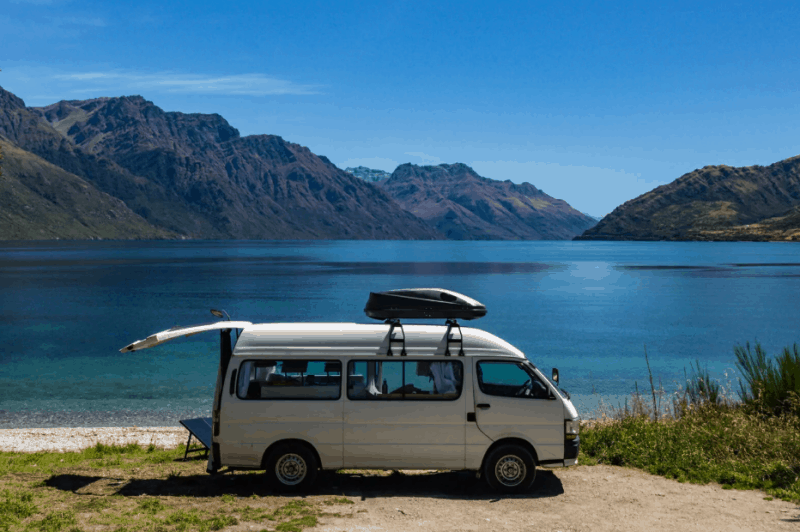
This is Birdie, she took Nina and Garrett all around NZ (check the video at the bottom of the post for a tour of what Birdie is like on the inside).
WHO IS NINA?
Nina (Florida, USA) is a long term traveller who prefers spending an extended amount of time in a country instead of racing through to tick them off. You can check out her blog Where in the World in Nina for epic New Zealand content (including a post about decorating and selling your car 😉 ). She’s also a wealth of knowledge about working abroad, something a lot of people (you?) are seeking. Most of the time she travels with her Garrett, but they both don’t mind flying solo from time to time.
HOW THIS POST CAME TO BE
I’ve know Nina and Garrett since 2016 and knowing they bought a campervan for traveling NZ (in 2018) I wanted to learn how you do it.
I’ve never been through the process myself and had lots of questions, no doubt as you have. I’m from NZ and buying a car feels intimidating so I can only imagine how some of you feel if you’re from abroad.
So after Nina agreed to share the process she went through…
- We chatted on Skype with Nina answering all my questions.
- I had the audio transcribed and began editing to make it into a readable post.
- Our chat jumped around a bit so I restructured the information, cut out the stuff that’s not relevant, my
um’s, ah’s, and excessive Kiwi slang. - Edit.
- Edit.
- Edit.
- Checked with Nina that the information was correct and she was happy with everything.
- Hit publish!
Alright, let’s get into the heart of the post. My (Jub’s) questions are in bold. Everything else I’ve paraphrased from the talk with Nina.
HOW TO BUY A CAMPERVAN IN NEW ZEALAND
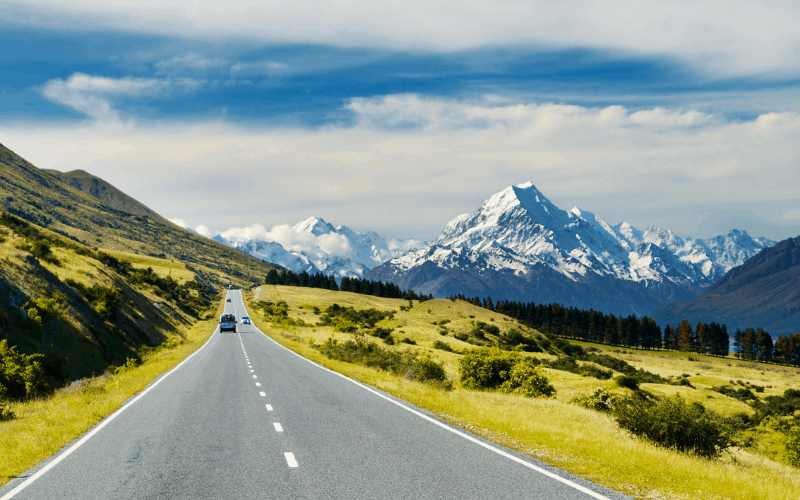
Will this be you in the campervan?
WERE YOU ALWAYS GOING TO BUY A CAMPERVAN? DID YOU CONSIDER RENTING AT ALL?
Yeah, we knew we were going to buy one straight from the get-go.
SO, WHAT WAS THE FIRST THING YOU DID WHEN YOU COMMITTED TO BUYING A CAMPERVAN IN NEW ZEALAND?
It’s scary how easy it is! To start, we had to be clear on what features we wanted.
Our most important non-negotiables for the campervan? It had to have a:
- high top
- long wheelbase
- valid self-contained certificate
We didn’t want a mom van as it’s too small for two people to be working and living in and we wanted lots of storage space.
We also didn’t want to build the van ourselves so in a perfect world, it’d have a:
- table
- bed
- sink
- updated WOF
- storage space.
We weren’t worried about aesthetics as we can make it pretty, but we didn’t want to be installing everything ourselves.
Our ideal campervan would also be a diesel engine as they’re sturdier.
You should get your non-negotiables and budget sorted before you start to look at cars for sale. You can tweak both as you go but having a starting point is a good idea.
Our max budget was $12-13,000 (NZD). But if we were buying a campervan at the upper end of the budget, everything needed to be perfect. Most backpacker vans are under 10k, so we were on a ‘luxury’ end of the scale!
It’s also important to note that we bought in high season, November to February when people can charge more because the demand is higher..
OKAY, SO YOU KNOW WHAT YOU WANT IN YOUR DREAM VAN. WHERE DO YOU START LOOKING TO FIND ONE?
The best way to find campervans for sale in NZ is by going joining Facebook groups…yes really! Most backpackers are on there, and the Facebook Groups related to buying and selling cars in NZ have lots of members. We knew we were going to start our trip in Christchurch, so we joined a bunch of Facebook groups and started looking for a campervan to buy about a week before our flight to New Zealand.
These are some of the Facebook groups I joined:
- Backpacker Cars New Zealand
- New Zealand https://backpackermarket.nz, campervan, camping gear
- Christchurch buy & sell cars and vans
- New Zealand Backpackers buy or sell car, campervan, camping gear
As you can see, there’s no shortage of backpacker campervans for sale in New Zealand.
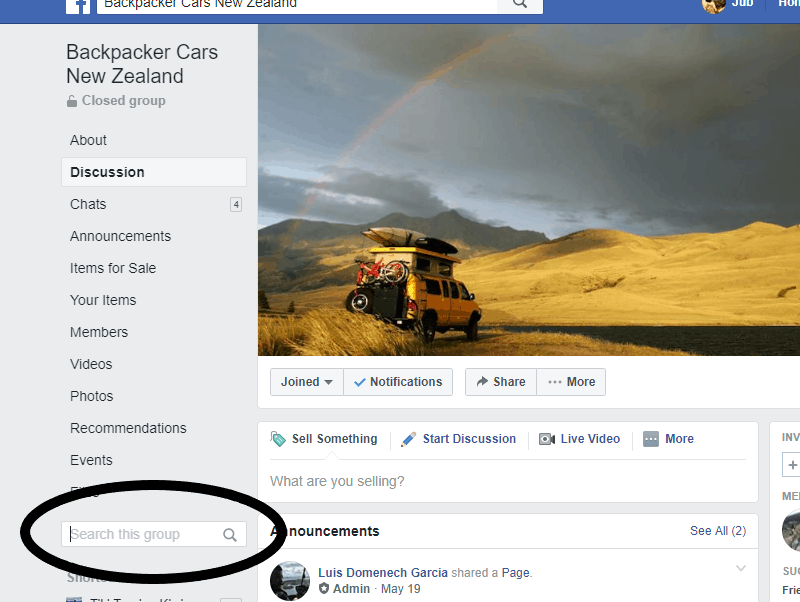
If you type your city of choice in the search bar circled in the photo (on desktop only), you can filter the results to sales in your specific city. That’ll save you scrolling time!
We were going to be in Christchurch for a month so we only searched vans that were in that area. We joined a few other random groups because we could catch a bus to somewhere if we really liked a van…and drive it back. And that’s what happened, we saw a campervan we liked before arriving in New Zealand so were in contact with a girl on Facebook Messenger.
The van was a 1998 Toyota Hiace with 250,000km on it and cost $10,000.
We didn’t commit to buying the campervan straight away as we wanted to see what else was available once we arrived. In the end we looked at one other car because it was in Christchurch, and while it was good, it didn’t tick all of the boxes for our ‘musts’, and we didn’t want to compromise on that.
So after getting back in touch with the original girl via Facebook Messenger we learned that she had yet to sell the van.
She was living in Queenstown which is expensive to get too so we were a little bit uneasy, that we weren’t going to be able to see it. And if we did go to Queenstown we might not like it when we got there. Fortunately, she offered to drive to Christchurch as she wanted a smaller car now that she was based in Queenstown. So it worked out well because there are more cars for her to buy in Christchurch so we gave her gas money and she drove from Queenstown to Christchurch.
If we didn’t like the car, she got to keep the gas money but if we bought the campervan, the gas money would go towards the final price. We’re talking like $100.
AND DID YOU YOU DO ALL THE COMMUNICATION ON FACEBOOK MESSENGER?
We did everything through Facebook Messenger. I like it because there’s like a little bit of accountability there with the person’s profile being right there and you can take screenshots of their account etc. There’s a little bit more trust when you can see their profile on Facebook, for whatever reason it makes me feel a little bit better. We didn’t need to talk on the phone at all.
DID YOU ADD HER AS A FRIEND ON FACEBOOK?
No. We did have some weird feelings here and there regarding trust as it’s weird to just hand over a large amount of cash. So Garrett and I discussed it and after doing so we felt good about everything with her.
It is weird, but it’s the best way to do it because unfortunately, it’s a common thing to see in groups people saying backpackers are getting taken advantage of by mechanics, etc because foreigners are easier targets. You can see it on Google Reviews for mechanics too. So trusting a backpacker who is also trying to save a buck is not that weird.
SO YOU SEE THE VAN, AND YOU’RE FIRST IMPRESSIONS ARE GOOD?
Yea, I think so. We saw all the pictures beforehand so I knew what condition it was in. It’s what we call a creeper van in the USA and given our budget it’s on the higher end of quality for a backpacker car.
Jub here. I can’t say I’d heard of a creeper van before. Turns out it’s American slang. This Urban Dictionary definition is exactly what I was thinking…Google Images gives some interesting results too.
In New Zealand we refer to them as tradie vans as they’re used by people working in the painting and plumbing industry (known as tradies). When the tradies upgrade their vans, they’re often sold on as a campervan for backpackers due to the decreased value of the van which often has lots of miles put on them. Once a backpacker buys a van, that van will usually circulate among travellers coming and going through New Zealand for years to come.
When we saw it, we checked to see what the oil looked like and took it for a test drive. Don’t forget to ask the seller all the regular questions…this is when we even learned it was insulated!
One thing to keep in mind is that we were buying a diesel engine. If you are, you should always ask people if they have paid their diesel tax and ask for the papers relating to that. It’s not that cheap, we paid 450USD (~700NZD) for 10,000km.
So if they don’t pay it before they hand the ownership over, you might be paying for thousands of kilometres you drive.
It’s Jub again. The diesel tax in New Zealand is officially called Road User Charges (RUC). When you buy petrol (gas), an excise tax is already applied to the final price whereas the price you pay for diesel includes no tax. RUC funds go towards road maintenance and improvements. In theory, the RUC for both petrol and diesel vehicles should be the same on average.
You can read more about RUC (including payment options) here.
But the diesel thing was fine for us, as it was on our preferred list of things we wanted. Garrett said diesel engines last longer and are a bit more rough and tough.
YOU DIDN’T TAKE IT TO THE MECHANICS TO GET CHECKED?
You know, we kind of went with the gut feeling with a bit of Garrett getting a little down and dirty looking at the campervan. In addition to the oil he had a look at the other bits and pieces and we listened for noises when we drove it around. He stepped on the gas, slammed on the brakes, you know you just do those little regular checks.
We did take it to a mechanic shortly after we had handed over to cash. One of my suggestions if you are by yourself or if you’re like a totally clueless about cars is to get it checked by a mechanic in advance, even before you look at it. If you’re serious about a car you can ask the seller to take it to a mechanic for a 100+ point check. It shouldn’t cost more than $100-200 and you can come to an agreement that you’ll split the cost. If they are hesitant to do this, your spidey senses should be on alert.
AND BECAUSE YOU HAD ALREADY HANDED OVER THE CASH WHAT WOULD HAVE HAPPENED IF THE MECHANIC FOUND PROBLEMS WITH THE VAN?
We would have just dealt with it. It’s an old car so it’s not going to be perfect and the buyer factored everything into the price so we got a fair deal. We brought it to the shop and they mentioned one or two small things, but it was like ‘Oh, this tire will need to be changed, probably within the next few months’. As long are your not talking about the transmission falling out or something like that you’re probably fine. Basically, anything major, I think we would’ve noticed on the test drive, even if I’m somebody who is not very savvy with cars.
AND WHEN YOU TAKE THE CAR FOR A TEST DRIVE, DOES SHE GIVE YOU THE KEYS AND IN THEORY, YOU COULD DRIVE OFF?
No, no, we had three seats, so went together around the neighborhood.
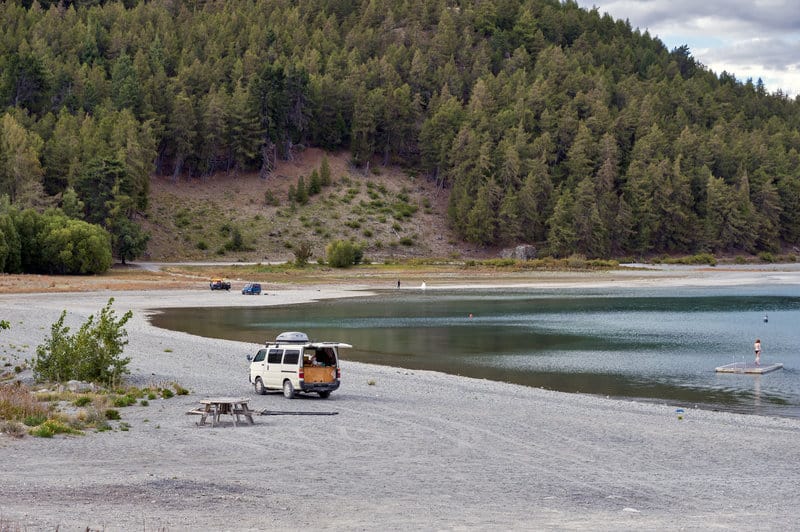
Not a bad spot to spend a couple of hours relaxing in your home (Lake Tekapo).
SO ON YOU’RE LIST OF NON-NEGOTIABLES, YOU WANTED A SELF-CONTAINED CAMPERVAN. WHATS DOES THIS MEAN? I ASK AS FREEDOM CAMPING HAS BEEN CONTROVERSIAL IN NZ
Self-contained means that there’s essentially a place for your wastewater to go. So when you’re washing dishes in the sink the water doesn’t just drop outside because when you start adding chemicals Bew Zealand doesn’t want them in nature, obviously. The same for when going to the bathroom. So when you’re self-contained you have like a little portable potty. You do your business in it and then you have to potentially dump it.
We didn’t want to go through all the trouble of getting a self-contained vehicle set up and then applying for the certification. And we don’t actually know that entire process necessarily because we didn’t have to do it. When you get self-contained the sticker is valid for a few years.
So the whole premise of being self-contained is that if you want to do any freedom camping, which a lot of people do, you can.
We had a sink and a portable potty. So now you don’t actually know you’re probably thinking, okay, that’s gross…I don’t want to be dealing with dumping my business at the dumpsites, that sounds nasty, etc.
Well, you don’t have to use these things. So when we chose a campsite we chose one’s with bathrooms because we did not want to have to deal with the chemicals in the potty finding a proper dumpsite. So, if you don’t want to, you don’t have to use it, just don’t go in nature! And so, that’s the main benefit of having a self-contained vehicle. It opens up your options for camping around New Zealand. If you’re not self-contained you are then contained to only going to certain campsites, that offer certain facilities which usually cost money. And freedom camping is free.
SO THERE’S A STICKER THAT GOES ON THE VAN THAT SAYS YOU’RE A LEGITIMATE SELF-CONTAINED VEHICLE?
Yes, you have a sticker that says self-contained, and they do check and you can get tickets if you’re not a fully self-contained vehicle in a camp designated as self-contained only. You can find out the relevant information for freedom camping spots on the Campermate App.
THE SELF-CONTAINED STICKER
Everyone refers to the sticker, but there’s more to it than that. You need the blue stick, the self-containment certificate, and must always display the warrant card.
You can find out more, including the complete requirements for a self-contained vehicle here.
The requirements will change often…the sticker is relatively easy to obtain at the moment. And I’ve yet to hear of anyone who goes to the toilet in their car regularly…si I wouldn’t be surprised if the requirements change in the future.
WHEN YOU DECIDED TO BUY THE VAN, DID YOU NEGOTIATE ON THE PRICE?
We tried, but she was pretty stiff. We were only gravitating towards this van as there were not too many others that ticked our boxes, and it was within our budget. And we only had three weeks left of our Airbnb in Christchurch so we wanted to get a van so we could start doing all the things that we want to do it to have it ready for us.
SO DO YOU JUST PUT THOUSANDS OF DOLLARS IN A DOGGIE BAG AND HAND IT OVER TO HER IN A CARPARK? HOW DO YOU PAY FOR THE VAN??
Yeah you hand over a lot of cash and then get the keys.
FOR REAL?
Yea, you do pay in cash because there are some scams with other payment methods. You will have to be naive not see the red flags, but maybe my eyes are different because I’m way warier after traveling for a while. Just in case anybody thinks that it’s ok to get paid in a bank transfer in school, I would like to perhaps just change your mind a little bit. There are scams where people will deposit the money, and then cancel it right after.
Paypal can be canceled by a dispute after the funds have been transferred and some people do this regularly.
Another scam is someone can say ‘Oh, hey, I really like your van, but I’m not in the country right now. Coming soon. Can I put some money in your PayPal account or whatever, and you put the keys in my friend’s mailbox?’
People fall for that.
So that’s why cash is better. But in saying that if you do build some trust, you can totally do bank transfers. But cash is preferred and do note you may have to go to ATM, a few times in a week because of withdrawal limits.
RELATED POST: THE CHEAPEST WAY TO SEND MONEY TO NEW ZEALAND
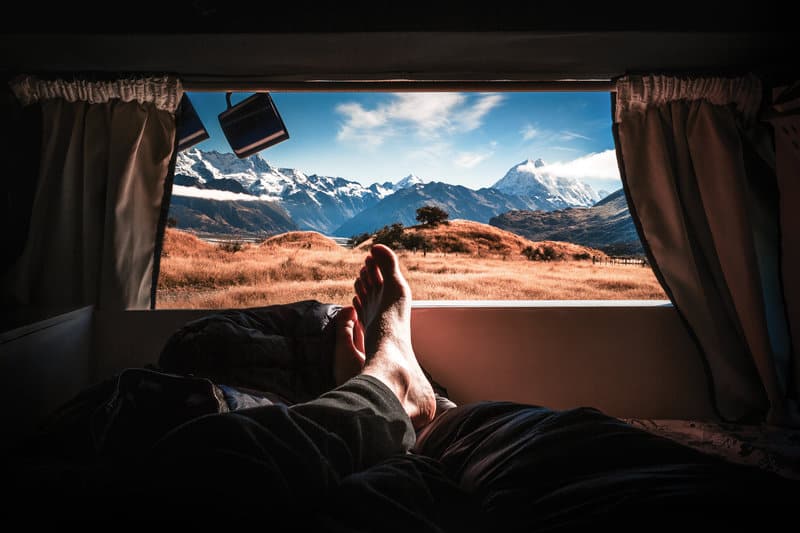
Ewwww, feet. Wouldn’t complain waking up to this view though!
AND HOW DO YOU BECOME THE OFFICIAL OWNER OF THE CAMPERVAN? I BELIEVE YOU NEED TO GO TO THE POST OFFICE?
Yeah, we just went to the post office and we’re like, “Hey New Zealand this is our car now kthanksbye.” In reality, we handed over some cash to a lady at the post office. We didn’t really know what we were doing but the lady at the counter was super helpful with everything. It’s such an easy process!
For more official details (the process is really easy) AA lets you know what forms you need. Buy just going into any NZ post shop will do the trick!
Changing vehicle ownership is important. If there are any warrants/outstanding debts related to the vehicle, you don’t want to be driving it under someone elses name!
AND THE LAST QUESTION IS ABOUT THE VAN’S WOF. WHAT’S THE STORY?
This is important! You want to make sure the car that you purchase has an up to date WOF (Warrant of Fitness) because that’s the reason why you can trust some cars won’t be lemons. Depending on what type of car you buy, your WOF needs to be updated every six months or 12 months.
So ours was six months because it’s an old car, and a WOF is a great way to know that your car is roadworthy. So if you’ve got the updated book and WOF on the car you’re purchasing, you’re pretty good. You shouldn’t have anything to worry about because a couple of months ago, this person has brought their car to a mechanic who has granted another book.
A FEW FINAL THOUGHTS FROM ME ON BUYING A CAMPERVAN IN NZ
Having talked to quite a few (at least a dozen) backpackers in campervans, I’ve come to realise one thing. Having some knowledge about how to fix campervans is super handy and can save you plenty of money with any small problems.
If you haven’t got much experience, a little bit of confidence and watching YouTube videos will often suffice.
Or, if you meet someone who mentions they’re a mechanic, make sure to be best buds with them. They’ll be able to help you with buying a campervan too 😉
AND, THAT’S HOW YOU BUY A CAMPERVAN IN NEW ZEALAND.
AND TO FINISH IT OFF, THE SPEEDY THREE
What are the best campervan apps that helped you travel New Zealand?
What was your favorite Kiwi snack?
Don’t really have one as we were buying healthy stuff from the supermarkets a lot of the time.
What’s your best New Zealand travel tip?
Buy a DOC (Department of Conservation) campsite pass. We found they’re extremely valuable and we got a discount for being NZMCA members. It lets you stay in your campervan at over 200 DOC campsites for free (check the links below for full details which are different if you’re renting).
These campsites cost $8-$13 per night per person, so it paid for itself within a couple of weeks. Make sure you’re going to be in the country long enough, and if you’re okay with those kinds of campsites as they are bare bones. Though the locations often have views of the mountains or will be by a trailhead. But do your homework!
READ MORE: 70 NEW ZEALAND TRAVEL TIPS
It’s Jub here. I hope you learned a thing or two from Nina’s recap of her New Zealand campervan buying experience. If you have any questions about buying a campervan or any other car in New Zealand, feel free to ask in the questions below and I’ll get you an answer ASAP.
Want to get to know more of Birdie, now that you know her background? Check out the van tour below.
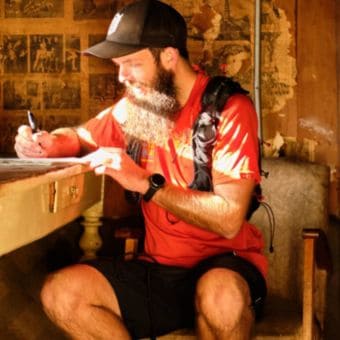
Hey, it’s Jub here. I’m the guy behind Chur New Zealand, helping you have the best time hiking, trekking, walking…whatever you want to call it…in NZ. I’m based in Queenstown and am always out and about exploring trails, old & new. If you have any questions, reach out.

Hi there 🙂 for buying a car I recommend you to include https://www.travelcarsnz.com
For me it worked better than the fb market.
Regards!
Cheers Joe! Great shout…any website that doesn’t have an about page makes me feel weird.